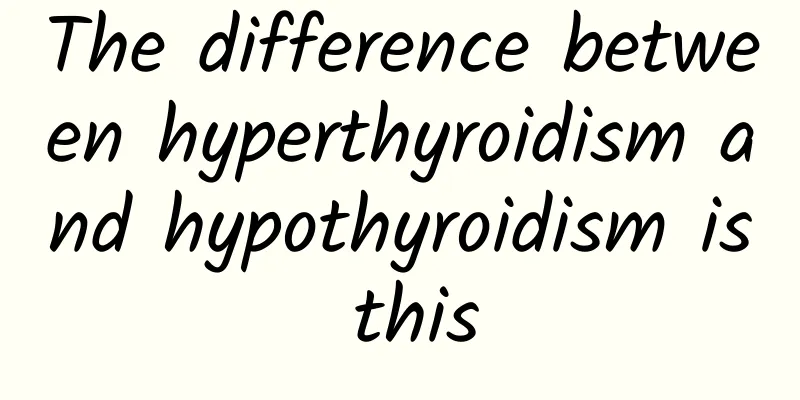The difference between hyperthyroidism and hypothyroidism is this

|
In life, many people know about hyperthyroidism but not hypothyroidism, and they don’t know what symptoms, hazards and differences there are between the two. Hyperthyroidism: It is a disease caused by excessive synthesis and release of thyroid hormone, which leads to hypermetabolism and sympathetic nerve excitement, resulting in palpitations, sweating, increased eating and bowel movements, and weight loss. Most patients also often have symptoms such as exophthalmos, eyelid edema, and decreased vision. Basic symptoms of hyperthyroidism: 1. Hypermetabolism requires the body to increase food intake 2. Increased gastrointestinal activity and more frequent bowel movements 3. Although the food intake increases, the oxidation reaction increases, the body's energy consumption increases, and the patient loses weight 4. Palpitations, tachycardia, insomnia 5. Being sensitive to things around you, with mood swings and even anxiety. Dangers of hyperthyroidism: If hyperthyroidism patients do not receive proper treatment for a long time, they will suffer from weight loss and hyperthyroidism heart disease. Weight loss patients are often prone to acute infectious diseases, which can lead to disability or death. Hyperthyroidism heart disease causes heart enlargement, arrhythmia, atrial fibrillation and heart failure, and patients lose their motivation and even die. Hypothyroidism: It is a disease of systemic metabolic dysfunction caused by reduced synthesis of thyroid hormone. Although it is not difficult to cure, a small number of patients may suffer from the disease for life and need to take medication continuously, which seriously affects the patient's physical and mental health and reduces the quality of life. Basic symptoms of hypothyroidism: 1. Lack of energy and fear of cold 2. Sleepiness, fatigue, laziness, slow movements 3. Eat less but gain weight, edema, hoarseness 4. Swollen eyelids, thick lips and enlarged tongue, yellowish and dry skin, sparse hair that easily falls out 5. Memory loss and slow reaction 6. Depression, palpitations and shortness of breath Hazards of hypothyroidism: If hypothyroidism patients are not treated in time, they may develop a series of autoimmune diseases such as nervous system weakness, angina, heart failure, digestive system damage, joint disease, etc., which will seriously affect the physical and mental health of patients and reduce their quality of life. |
<<: What are the nutritional values of almonds and what foods should not be eaten with them?
>>: What are the differences and symptoms between thyroid and hyperthyroidism?
Recommend
What is the normal length of a man's penis? How to measure it?
The length of a man's penis has an impact on ...
What is the cause of cold testicles?
There is no unified measurement standard for test...
What is scrotal angiokeratoma? What are the clinical symptoms?
Compared with other organs, the scrotum of men se...
What harm does prostate disease cause in men?
The prostate is an important organ in the male bo...
Is cryptic testis surgery a major or minor surgery?
Men will also have many symptoms. When symptoms o...
What's wrong with the sudden pain in the balls?
Testicular pain is indeed a very embarrassing thi...
Wild chrysanthemum suppository for the treatment of prostatitis
Wild chrysanthemum suppositories are a kind of dr...
How can excessive masturbation help maintain kidney health?
Nowadays, many male friends in life often satisfy...
What's the matter with the white film on the glans?
The glans of a man is a very private part, and th...
Characteristics of male breast development
A while ago, a report made people laugh and cry. ...
Can penile induration heal on its own?
The cause of penile nodules is still unclear at t...
Mild penis granulation pictures
Penis pain After ejaculation, urination will caus...
Can a phimosis person serve in the military?
The military physical examination will check the ...
If men regularly do these three exercises, their sexual function will be significantly improved!
It is common knowledge that exercise can keep the...
Purple bumps on scrotum
Purple bumps on the scrotum are caused by bad eat...









